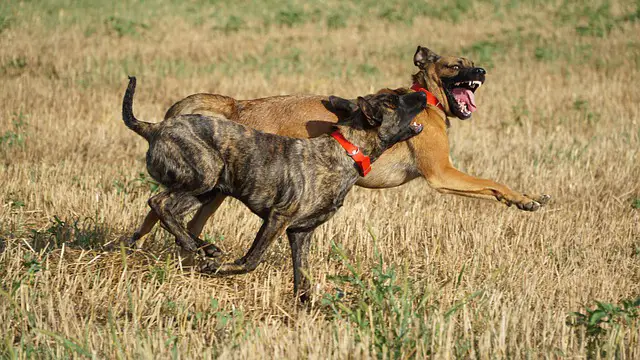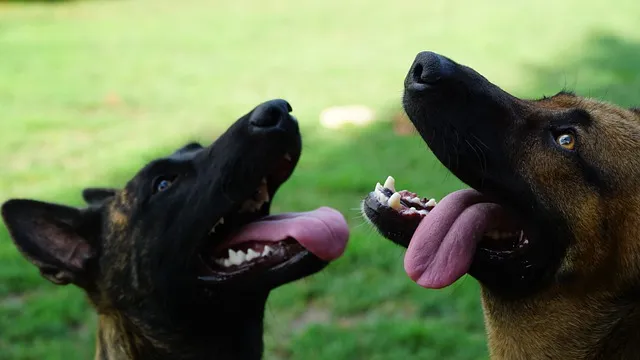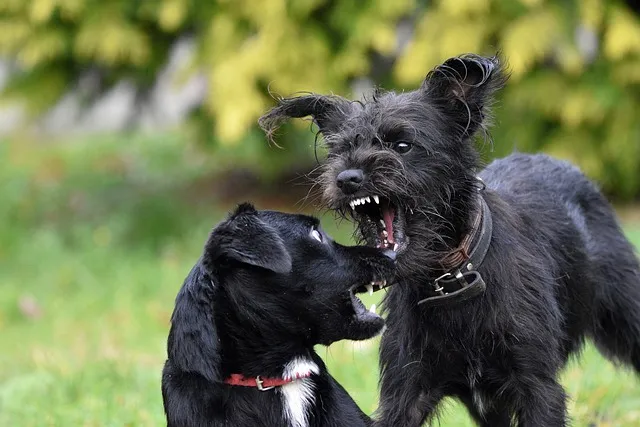The Dutch shepherd is a robust, active, and athletic breed of medium build. Originating in the Netherlands, this dog is a suburb herding breed used to reign in and gather livestock. They are excellent guard dogs as well as affectionately loving and loyal family pets.
Because the Dutch shepherd is used to working life, they like to be busy and require plenty of exercise. They need to be both physically and mentally challenged or they will become bored.
Boredom usually leads to problem behavior, as your Dutch shepherd will try to find something to keep them busy and this generally involves unacceptable and undesirable behavior. This is also the case in many dog breeds that are instinctively working dogs.
The Dutch shepherd becomes devoted, loving, and quite attached to their family, which may cause them to be protective.
Being protective is a good thing if there is a good reason or danger, but what about if they become too overprotective? This brings us to the subject of aggression. Are Dutch shepherds aggressive?
In this post, I will answer this question and give you information about Dutch shepherd aggression. Also included will be how to stop the dog’s aggression.

For your dog’s vitamin supplement, foods, toys, or other dogs product please visit the Health Extension website.
Are Dutch Shepherds Aggressive
In general, a Dutch shepherd is not an aggressive breed. They are hard-working, intelligent, athletic, active, affectionate, and loving, especially with family.
All dogs, however, do need to be socialized as puppies and have serious training to become well-behaved and obedient and this includes the Dutch shepherd. This breed can be protective in nature.
Dutch shepherds also need plenty of exercise and games which provide both physical and mental stimulation.
When dogs become bored due to a lack of stimulus and too much energy, behavior problems can ignite.
Any dog can become aggressive due to improper training or its genetic makeup. Checking with your breeder to make sure there are no hereditary behavior or neurological issues in the breeding pair as well as health problems, gives a high percentage of receiving a well-rounded even-tempered shepherd.
To check your Dutch Shepherds’ health status or their DNA checks, please visit the Embark vet website for all the help you may need.
Signs of Aggression in Dogs
In movies, we always cheer on the hero dogs that take down the bad guy with a lunge and much snarling, snapping, and biting but we also don’t want to see this behavior firsthand by our dogs or any dog we meet. So, just what are the signs of aggression?
- Fur is raised
- Whites of eyes showing
- Raised but wagging tail, stiffly (not in a friendly way)
- Tucking tail with tail down
- Growling
- Snapping
- Lunging
- Biting

Reasons For Aggression
Although we may feel that there is never a reason for aggression, sometimes there is a logical reason for it, but we do not always know what goes on in our dog’s mind.
They may beg to differ and either see a good reason for aggressive behavior or it can be instinctual or something they are unable to control. Reasons for aggression are listed below.
- Fear – Fear can cause some dogs to cower or hide when fearful. Dogs not properly socialized may be afraid of many things. Others may become aggressive. Rescue dogs that have had a life of abuse need time to build trust.
- Frustration and boredom – Dogs left alone too often for long periods whether crated or outside can begin to show aggression.
- Want to be dominant – These dogs want to be the Alpha dog in charge and show dominance over their owners and other pets if allowed.
- Sickness or pain – If your dog is ill, injured, or in pain, it may lash out suddenly when touched especially if the area is painful. Brain tumors or neurological issues can also cause aggression.
- Possessiveness – This is known as possession aggression and occurs when someone tries to take a dog’s food, toys, etc. A dog can even be possessive of its owner, lunging at someone who approaches while walking.
- Territorial or protection – Dogs can also become aggressive if someone comes onto your property or to protect you if they sense danger from a stranger.
Preventing Dog Aggression
Aggression can occur in any dog whether large or small. Many large dogs have bad reputations as aggressive and biting dogs such as the German shepherd, rottweiler, and Doberman pinscher, but this is an unfair assessment.
While aggression can be inbred in many dogs due to improper breeding, already made up of bad genetic behavioral traits, the environment also plays a role in your dog’s temperament. A few tips to prevent aggression in dogs or Dutch shepherds follow.
- Socialization
Socialization – Puppies should be socialized as soon as you take your dog home. Begin to get them acclimated to as many people, places, dogs, animals, sights, sounds, smells, environments, and situations as possible.
This way they will not grow up to be fearful or untrustworthy of any circumstance that comes their way.
- Training
Training – Overall training is necessary for a well-behaved adult Dutch shepherd. Of course, potty training should begin immediately, but command training with short sessions at first can also begin.
As your puppy gets older, include more advanced obedience training. Classes are a great way to help both you and your pup by learning the correct methods and building confidence.
Classes also provide much-added socialization with other pet parents and their dogs which is a plus for your pup to become acclimated to other people and dogs.
- Alpha
Alpha – From day one, you must assume the role of Alpha leader of the pack and always be in charge.
From their ancestry, dogs have lived in packs, having one member, the Alpha dog or wolf being the leader. This is instinctual.
Being Alpha for you does not mean yelling or using force, it just entails patience, being firm, and sticking to your guns.
“No,” should always be “no.” Not, “yes,” one time and “no,” another. This is too confusing for your dog and does not set the tone for a leader.
In your pup’s adolescent and juvenile stages, they may become willful, stubborn, or challenge your authority, but you must never let them take the lead. Always be firm and in control.
How To Stop A Dogs Aggression

Here are a few tips for stopping and helping aggression in dogs.
- Identify the Trigger – All dogs normally have something that triggers aggression. If there is a way to avoid the trigger, this is the best course. If, for example, your dog only becomes aggressive while passing a house with a dog or owner they do not like or trust, avoid the trigger and take a different route. If taking food or toys off of your pup creates aggressive behavior, this can be more difficult. As a pup, training should involve showing your shepherd that you can take food, toys, or any off-limits objects off of them without a fuss, otherwise, this is when aggression can begin.
- Punishment – Never punish your dog for aggressive behavior, which can backfire and make it worse, especially if you lose control and begin yelling and screaming. This will only exacerbate and escalate the situation.
- Calm – Try to remain calm and stay in control. If you become angry, they may become angrier.
- No rewards – Do not reward or bribe your dog. Don’t offer them a treat to drop a shoe they will angrily not relinquish. This is just rewarding bad behavior. This kind of behavior will continue with the “bribing” every time with no solution for aggression.
- Reward good behavior – Good behavior should be rewarded, When your Dutch shepherd is playing nicely or just lying quietly, give them good praise or a treat. Everyone likes to be noticed in a good way, even dogs and they will realize they get better attention while behaving well.
- Be alert – If you know that your shepherd has aggression problems, be watchful and alert in social situations and especially around triggers. If they remain calm, give them plenty of praise, otherwise, move to a different location.
- Exercise – Exercise your Dutch shepherd. They require plenty of exercises, not just for health, but for emotional well-being so they don’t become bored or aggressive. Playing games is also essential. These things may be all it takes to squelch any aggression.
- Be consistent – Always be consistent and be sure that everyone in your household is as well. Rules should be agreed upon and stuck to. Family members with different rules will only confuse your dog, and create aggression or other behavioral issues. Everyone needs to be on the same page.
- Routine – Create a routine. This way your Dutch shepherd knows just what to expect and when. You will be surprised just how your dog will anticipate and remember your next move with a routine.
- Be patient – Behavior problems cannot be remedied overnight. It takes patience and time.
- Veterinarian – If your Dutch shepherd has become aggressive overnight and totally out of the blue, there may be an underlying medical reason for this, whether a toothache, some type of pain, or illness. Check it out with your veterinarian. The solution may be quite simple.
- Medication – Your veterinarian may prescribe medication if your dog is overly hyper or anxious which has been causing aggression.
- Seek help – If you are making no headway with an aggression problem, speak with your veterinarian. They may suggest training to desensitize them from aggression or a behavior therapist. You don’t have to go this alone if you are out of options. An aggressive dog can become dangerous but there is help out there.
So, to answer the question “Are Dutch shepherds aggressive?”, Dutch shepherds are rarely an aggressive breed.
Keep in mind that using a reputable breeder when getting a Dutch shepherd will cut the chances of taking home an aggressive dog and also one with health issues as well.
View the parents and puppies beforehand to see how they act towards their littermates. You don’t want a bully, but you also don’t want to choose the shyest pup either.
Proper training and plenty of exercises will play a role in your shepherd’s temperament and personality.
Being a pet parent is a big responsibility but can also be very rewarding, giving you years of love and companionship with your good friend.